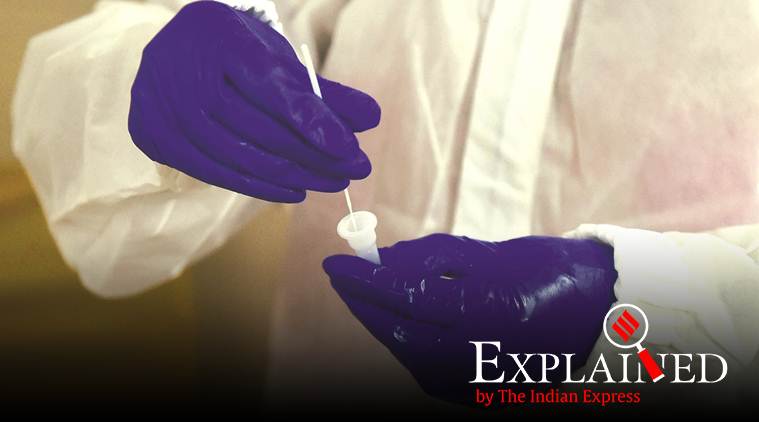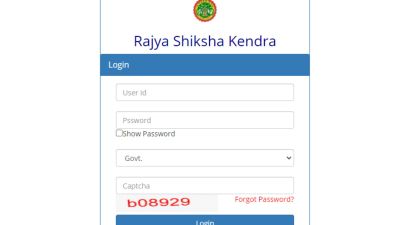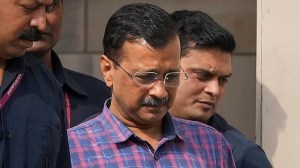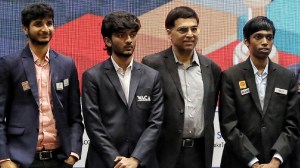- India
- International
Explained: A look at India’s evolving strategy on testing for Covid-19
Covid-19 Testing: In ICMR’s updated strategy, all symptomatic individuals anywhere in India are to be tested for Covid-19. At one stage, ICMR was cautious about testing indiscriminately. A look at how the protocols have evolved.
 A sample collected for rapid antigen test in New Delhi. (PTI Photo)
A sample collected for rapid antigen test in New Delhi. (PTI Photo)
On Tuesday, the Indian Council of Medical Research (ICMR) made a large shift in Covid-19 testing strategy, calling for “all symptomatic individuals in every part of the country” to be tested. It also urged private hospitals, offices, and public sector units to conduct antibody testing as a surveillance measure.
A look at how ICMR’s testing protocols have evolved since the outbreak began:
March: Reserved testing
On March 17, the strategy was far more hesitant than now. “To avoid indiscriminate testing and reducing panic and optimally utilise the resources of the country and scale up facilities for testing,” it said, under “Objectives”. The strategy focused only on three symptomatic people: international travellers, contacts of a case, and healthcare workers.
“Why should we go on telling people who have no history of travel or any contact with an actual case?” ICMR Senior scientist Nivedita Gupta had said to The Indian Express at the time. “In this process, in a huge country like India, I’m not able to test people who genuinely may need testing because I’m wasting it on futile testing. Though we are maintaining a stringent inventory, we also need to make sure that we are not in a situation where I exhaust all my testing capacity in futile testing and tomorrow, if there is an upsurge in cases, I say that I have exhausted all my tests.”
At the time, private players had not yet been roped in to conduct testing, and the ICMR was just instituting processes to expand lab capacity. At the end of March, it gradually expanded testing to include hospitalised patients with severe acute respiratory illness (SARI) as well as asymptomatic contacts of cases. The new focus ran alongside the agency’s first surveillance method — testing SARI patients to see if any were positive for Covid-19.
April: New techniques

ICMR advised rapid antibody tests in hotspots and migrant centres on April 4, leaving the decision to state governments. These tests are not diagnostic, but can determine if a patient has previously had coronavirus. States like Kerala, Tamil Nadu, and Chhattisgarh were eager to undertake this type of surveillance.
Later, the ICMR reversed its decision, given a batch of faulty kits from China. There also was divergence between the World Health Organization and ICMR in the beginning of April, with the former saying antibody testing should be used for research. Subsequent advisories from ICMR detailed antibody testing as “supplementary” to RT-PCR testing.
The ICMR also advised enhanced testing in 20 hotspots, including Nizamuddin and Dilshad Garden in Delhi, Pathanamthitta in Kerala, and Mumbai and Pune.
On April 9, it added symptomatic patients in hotspots, large migration gatherings and evacuee centres to the testing strategy. New ICMR research at the time also found the percentage of random positive samples of Covid-19 among SARI patients across the country has increased incrementally over the past month.
Don’t miss from Explained | The various drugs being used for treating Covid-19 symptoms in India
On April 13, the ICMR detailed pooled sampling in areas with few cases or low positivity rates. If any positive sample comes for a pool of samples, then individual testing follows. States like UP jumped onto the strategy.
The ICMR still faced a backlash for lack of testing. Responding to a question at the daily briefing, Dr R R Gangakhedkar, head of epidemiology and infectious diseases at ICMR, said: “As for testing strategy, your chances of testing positive become less as you near the infection time point. It comes positive when there are symptoms, so keeping in mind the cost effectiveness and risk-based approach, your yield will become less the sooner you test. Even to think about changing the testing strategy now… I cannot say.”
May: Expanded protocols
On May 18, ICMR added symptomatic migrants, hospitalised patients, frontline workers to the testing strategy. The inclusion of all “hospitalised patients who develop ILI symptoms” indicated the concern over patients contracting the disease in hospital. And the inclusion of “returnees/migrants”, irrespective of contact history or whether they are travelling from a hotspot, signalled concerns about possible community transmission.
Also in May, the Health Ministry decided not to test mild and moderate cases before their discharge or after a home isolation period.
The government also initiated a nationwide sero-survey to assess the spread. This was also spurred by ICMR’s validation of its own “indigenous” antibody test kit.
On May 30, ICMR reintroduced advice to states to use antibody tests, focusing on workers who have returned from other states, those who live in dense settings or poorly ventilated buildings; people who work in certain sectors; people in containment zones; police and paramilitary personnel, and prison officials, among others.
By May-end, the positivity rate in India had begun to steepen just as the country began testing over 1 lakh samples a day. Along with the expanding testing strategy, facilities and types of kits also gradually increased.
June: rapid antigen tests
The ICMR approved on June 15 a new on-site diagnostic kit for containment zones and healthcare settings, which can give rapid, low-cost results without needing a laboratory.
In containment zones, the rapid antigen test was encouraged for all people with fever and cough and all contacts of a case who are direct, asymptomatic, and have high co-morbidities. In healthcare settings, the test will be used for all patients of influenza-like illnesses suspected of having contracted Covid-19 and asymptomatic patients who are immunosuppressed or have other co-morbidities. The test will also be available for asymptomatic patients undergoing certain procedures such as neurosurgeries, dental work, and dialysis. While positive results will be considered confirmed, in case of negative results, an RT-PCR would be done for reconfirmation.
📣 Express Explained is now on Telegram. Click here to join our channel (@ieexplained) and stay updated with the latest
Maharashtra, Delhi, Gujarat, Haryana, and UP have procured rapid antigen testing kits. “All the states are gearing up now to start the testing with this and almost all states will eventually buy it. Many hospitals are also inquiring and placing the order for any symptomatic individuals in their hospital with a heavy viral load,” said an official from SD Biosensor, which is supplying the test kit.
The advisory on June 23 said: “Despite new types of testing kits being added, access to testing still remains a huge challenge in a large country like India.”
More Explained
Must Read
EXPRESS OPINION
Apr 23: Latest News
- 01
- 02
- 03
- 04
- 05






































